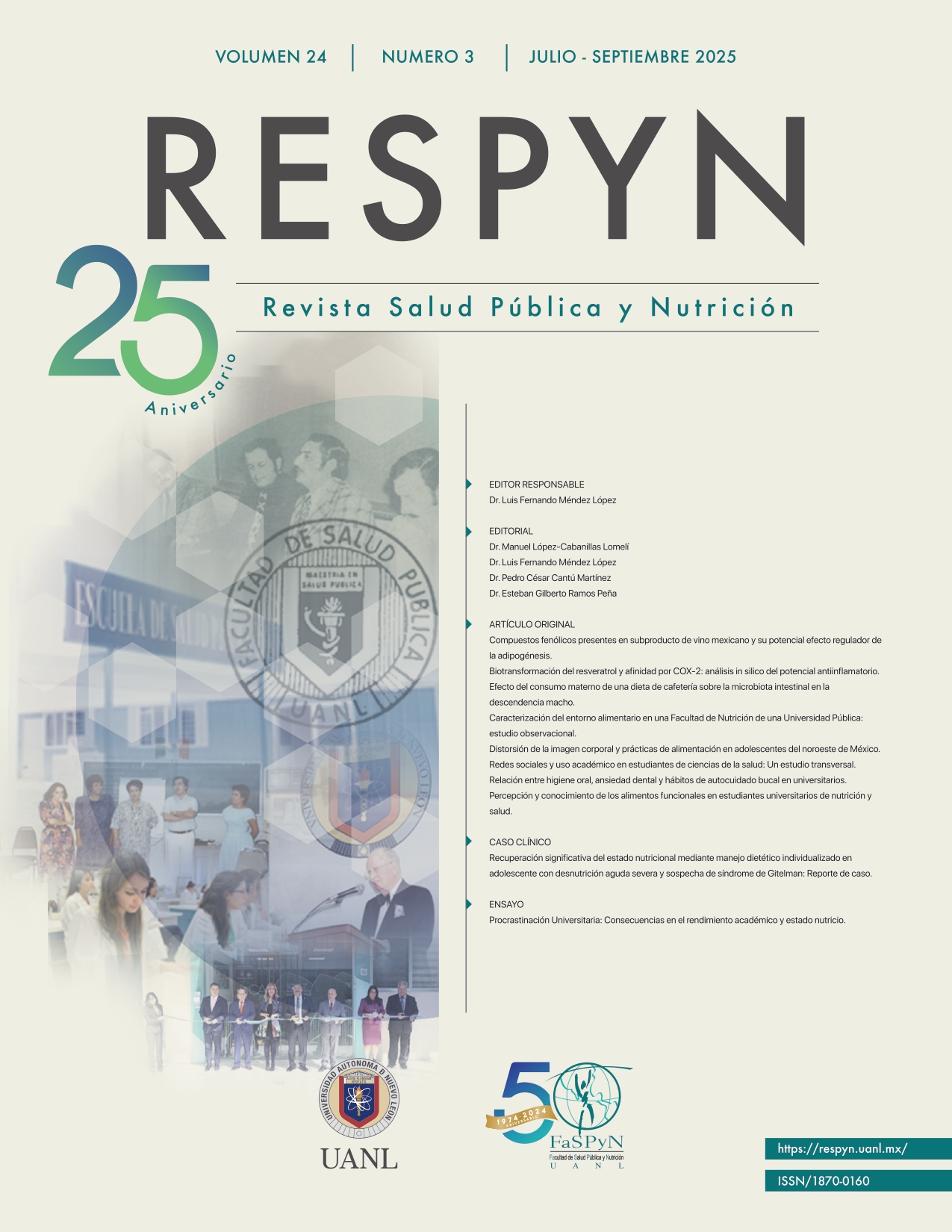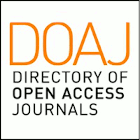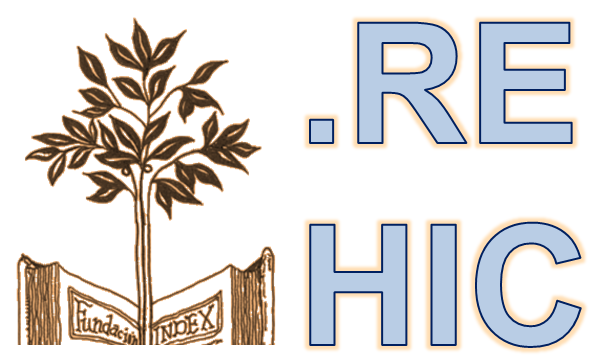Social media and academic use among health sciences students: a cross-sectional study
DOI:
https://doi.org/10.29105/respyn24.3-858Keywords:
Estudiantes, Ciencias de la salud, Redes socialesAbstract
Introduction: The use of social media is common among students, facilitating communication, information exchange, and its application in various academic aspects. Objective: To analyze the use, frequency, and perception of the usefulness of social media for academic purposes among health science students. Material and method: A cross-sectional study was conducted with 685 health science students using a convenience sampling method. A questionnaire was administered in the classroom to collect data on sociodemographic variables and social media usage. The data were analyzed using frequencies, percentages, means, standard deviation, and chi-square tests to identify differences by gender. Results: 73.0% of the participants were female, with an average age of 21.1 ± 2.5 years. Facebook and WhatsApp were used by 98.5% of the students, with an average usage of 4.6 ± 3.5 and 5.9 ± 4.4 hours per day, respectively. 88.6% used social media for academic purposes, with WhatsApp (92.1%) and Facebook (83.4%) being the most popular platforms. Gender differences were found in the use of Twitter, Instagram, Messenger, and Snapchat (p < .05). Additionally, 61.6% of students believed that social media fosters teamwork. Conclusion: WhatsApp and Facebook are the most commonly used social media platforms for academic purposes. It is recommended to diversify their use in academic activities.
Downloads
References
Asociación de Internet MX. (17 de mayo de 2022). 18º estudio sobre los hábitos de los usuarios de Internet en México. https://www.asociaciondeinternet.mx/estudios/habitos-de-internet
Barajas Villarruel, J. I., Benítez Lima, M. G., Noyola Rivera, R., & Buenrostro Morán, J. M. (2017). The use of social networks by the students of a Mexican public university. International Journal of Learning, Teaching and Educational Research, 16(10), 132–148. https://doi.org/10.26803/ijlter.16.10.10 DOI: https://doi.org/10.26803/ijlter.16.10.10
Botías Rubio, D., Botías Pelegrín, M., & Alarcón Vera, I. (2018). El papel de las redes sociales en educación. En C. López García & J. Manso (Eds.), Transforming education for a changing world (pp. 335–342). Adaya Press. https://doi.org/10.58909/ad18887865 DOI: https://doi.org/10.58909/ad18887865
Castro, P. J., & González Palta, I. N. (2016). Percepción de estudiantes de Psicología sobre el uso de Facebook para desarrollar pensamiento crítico. Formación Universitaria, 9(1), 45–56. https://doi.org/10.4067/S0718 50062016000100006 DOI: https://doi.org/10.4067/S0718-50062016000100006
Chávez Martínez, J. J. (2014). Las redes sociales en la educación superior. Revista de Educación y Desarrollo Social, 8(1), 102–117. https://dialnet.unirioja.es/servlet/articulo?codigo=5386178
Diario Oficial de la Federación. (2 de abril de 2014). Reglamento de la Ley General de Salud en materia de investigación para la salud. https://www.diputados.gob.mx/LeyesBiblio/regley/Reg_LGS_MIS.pdf
Fernández De la Iglesia, J. C., Casal Otero, L., Fernández Morante, M. C., & Cebreiro, B. (2020). Actitudes y uso de Internet y redes sociales en estudiantes universitarios/as de Galicia: Implicaciones personales y sociales. Revista Prisma Social, (28), 145–160. https://revistaprismasocial.es/article/view/3372
Gewerc Barujel, A., Montero Mesa, M. L., & Lama Penín, M. (2014). Colaboración y redes sociales en la enseñanza universitaria. Comunicar, 42(21), 55–63. https://dialnet.unirioja.es/servlet/articulo?codigo=4524701 DOI: https://doi.org/10.3916/C42-2014-05
Gómez Hurtado, I., García Prieto, F. J., & Delgado García, M. (2018). Uso de la red social Facebook como herramienta de aprendizaje en estudiantes universitarios: Estudio integrado sobre percepciones. Perspectivas Educacionales, 57(1), 99–119. https://doi.org/10.4151/07189729 Vol.57 Iss.1 Art.645 DOI: https://doi.org/10.4151/07189729-Vol.57-Iss.1-Art.645
González Martínez, J., Lleixà Fortuño, M., & Espuny Vidal, C. (2016). Las redes sociales y la educación superior: las actitudes de los estudiantes universitarios hacia el uso educativo de las redes sociales, de nuevo a examen. EKS, 12(2), 19. https://doi.org/10.14201/eks20161722138 DOI: https://doi.org/10.14201/eks20161722138
IBM Corp. (2017). IBM SPSS Statistics for Windows (Versión 25.0) [Software]. https://www.ibm.com/products/spss-statistics
Iglesias García, M., & González Díaz, C. (2014). Facebook como herramienta educativa en el contexto universitario. Revista de Historia de la Comunicación y Sociedad, 19, 379–391. https://doi.org/10.5209/rev_HICS.2014.v19.45606 DOI: https://doi.org/10.5209/rev_HICS.2014.v19.45606
Instituto Nacional de Estadística y Geografía. (13 de junio de 2023). Encuesta sobre disponibilidad y uso de tecnologías de la información y la comunicación en los hogares (ENDUTIH) [Comunicación social]. https://www.inegi.org.mx/contenidos/saladeprensa/boletines/2023/ENDUTIH/ENDUTIH_22.pdf
Islas Torres, C., & Carranza Alcántar, M. R. (2011). Uso de las redes sociales como estrategias de aprendizaje: ¿Transformación educativa? Revista Apertura, 3(2), 1–20. https://www.redalyc.org/articulo.oa?id=68822737001
Martínez Serrano, M. C., & Ferraz da Cunha, E. (2016). Uso de las redes sociales por los alumnos universitarios de educación: un estudio de caso de la península ibérica. Tendencias Pedagógicas, 28, 33–44. https://doi.org/10.15366/tp2016.28.003 DOI: https://doi.org/10.15366/tp2016.28.003
Morales Ramírez, A., Zacatenco Cruz, J. D., Luna Luna, M., García Lozano, R. Z., & Hidalgo Cortés, C. (2020). Acceso y actitud del uso de Internet entre jóvenes de educación universitaria. Revista Digital de Investigación y Documentación Universitaria, 14(1), 1–11. https://doi.org/10.19083/ridu.2020.1174 DOI: https://doi.org/10.19083/ridu.2020.1174
Neerú, S., Gaima, S., Madhur, V., Adarsh, K., Manmeet, K., & Lakshmi, P. V. M. (2020). Efecto de los sitios de redes sociales en la calidad de vida de los estudiantes universitarios: un estudio transversal de una ciudad en el norte de la India. Science World Journal, 2020, Article 8576023, 1–8. https://doi.org/10.1155/2020/8576023 DOI: https://doi.org/10.1155/2020/8576023
Prieto Navarro, L., Muñoz San Roque, I., & Torre Puente, J. C. (2021). Percepción y utilización de las redes sociales por parte de estudiantes de educación. Revista Portuguesa de Investigação Educacional, (21), 1–30. https://doi.org/10.34632/investigacaoeducacional.2021.10256
Rodríguez Gallego, M., López Martínez, A., & Martín Herrera, I. (2017). Percepciones de los estudiantes de ciencias de la educación sobre las redes sociales como metodología didáctica. Revista de Educación Médica, 50, 77–93. https://www.redalyc.org/pdf/368/36849882005.pdf DOI: https://doi.org/10.12795/pixelbit.2017.i50.05
Rodríguez Rodríguez, J., & Reguant Álvarez, M. (2020). Calcular la fiabilidad de un cuestionario o escala mediante el SPSS: el coeficiente alfa de Cronbach. Revista de Innovación y Revisión Educativa, 13(2), 1–13. https://doi.org/10.1344/reire2020.13.230048 DOI: https://doi.org/10.1344/reire2020.13.230048
Valenzuela Argüelles, R. (2013). Las redes sociales y su aplicación en la educación. Revista Digital Universitaria, 14(4), 1–14. https://www.revista.unam.mx/vol.14/num4/art36/art36.pdf
Vizcaíno Laorga, R., Catalina García, B., & López de Ayala, M. C. (2019). Participación y compromiso de los jóvenes en el entorno digital: usos de las redes sociales y percepción de sus consecuencias. Revista Latina de Comunicación Social, 74, 554–572. https://doi.org/10.4185/RLCS 2019 1345 DOI: https://doi.org/10.4185/RLCS-2019-1345
We Are Social & Hootsuite. (27 de enero de 2021). Digital Report 2021: el informe sobre las tendencias digitales, redes sociales y mobile. https://wearesocial.com/es/blog/2021/01/digital-report-2021-el-informe-sobre-las-tendencias-digitales-redes-sociales-y-mobile/
Downloads
Published
How to Cite
Issue
Section
License
Copyright (c) 2025 Karina Janett Hernández Ruiz, Georgina Mayela Núñez Rocha, Guillermo Cano Verdugo, Ana Elisa Castro Sánchez, María Natividad Ávila Ortiz, José Luis Jasso Medrano

This work is licensed under a Creative Commons Attribution 4.0 International License.
The rights of the work belong to the author or authors, however, by sending it for publication in the Public Health and Nutrition Magazine of the Faculty of Public Health and Nutrition of the Autonomous University of Nuevo León, they grant the right for its first publication in between electronic, and possibly, in print to the Public Health and Nutrition Magazine. The license used is the Creative Commons attribution, which allows third parties to use what is published whenever the authorship of the work is mentioned and the first publication that is in the Public Health and Nutrition Magazine. Likewise, the author or authors will take into account that it will not be allowed to send the publication to any other journal, regardless of the format. The authors will be able to make other independent and additional contractual agreements for the non-exclusive distribution of the version of the article published in the Public Health and Nutrition Magazine (e.g., institutional repository or publication in a book) provided they clearly state that The work was published for the first time in the Public Health Magazine, Magazine of the Faculty of Public Health and Nutrition of the Autonomous University of Nuevo León.














